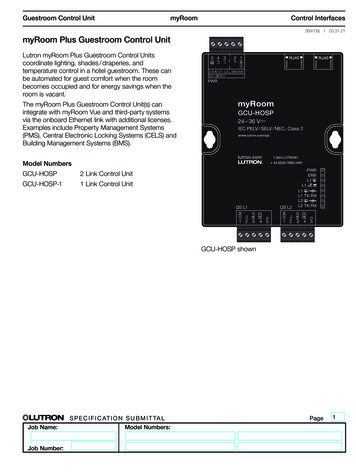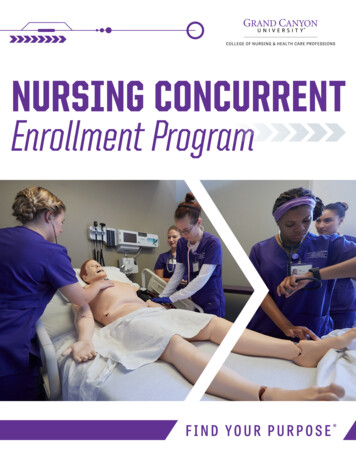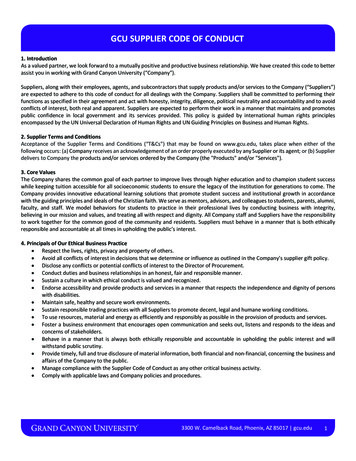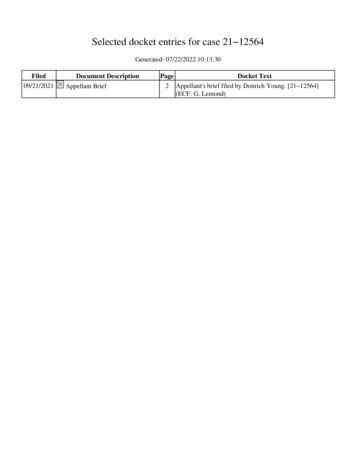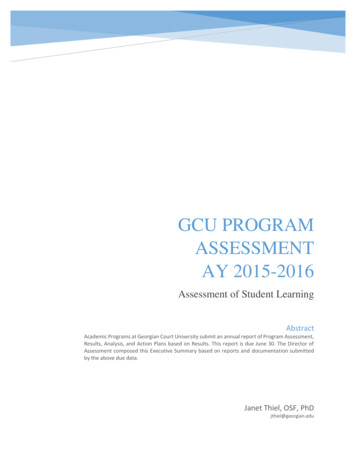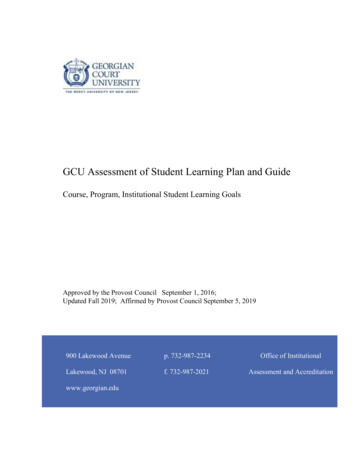
Transcription
GCU Assessment of Student Learning Plan and GuideCourse, Program, Institutional Student Learning GoalsApproved by the Provost Council September 1, 2016;Updated Fall 2019; Affirmed by Provost Council September 5, 2019900 Lakewood Avenuep. 732-987-2234Office of InstitutionalLakewood, NJ 08701f. 732-987-2021Assessment and Accreditationwww.georgian.edu
Table of ContentsExecutive Summary . 4Highlights of Georgian Court University’s Assessment Plan for Student Learning . 5University Programs: Institutional Student Learning Goals (ISLG) . 5Academic Program Assessment:. 5Course Assessment: . 7Timeline for Academic Program Assessment. 8GCU Mission, Mercy Core Values, and Institutional Goals . 9Mission Statement. 9Mercy Core Values: Justice, Compassion, Integrity, Respect, Service . 10Georgian Court University: Guiding Principle of the 2019 Strategic Compass . 10Institutional Student Learning Goals (ISLG) . 11Management of Student Learning Assessment at GCU . 15Accreditation by Middle States Commission on Higher Education (MSCHE) . 15MSCHE Standard V: Educational Effectiveness Assessment . 15Office of Institutional Assessment and Accreditation (OIAA). 17Academic Program Review and Assessment Committee (PRAC) . 17Assessment Funding . 19Assessment Software . 19GCU Plan for Assessment of Student Learning . 20ii
University-wide assessment of Student Learning (Institutional Learning) . 21University-Wide Assessment Surveys and Testing . 22Academic Program Assessment Planning and Reporting . 22Course assessment . 26Provost Council review of assessment results . 27Assessment of Student Learning: Key Principles, Assessment Cycle, and AssessmentArtifacts. 28Assessment basics . 28Artifacts for assessment of student learning. . 29Assessment rubrics. 32Assessment vocabulary . 34Assessment resources. 36Appendix A1. GCU Program Review Outline: Undergraduate Major Programs . 38Appendix A2. GCU Program Review Outline: Graduate Programs . 47Appendix B. Schedule of Academic Program Reviews . 54Appendix C. Academic Program Assessment Plan Template . 55Appendix D. Academic Program Assessment Report Template . 67Appendix E. Assessment Audit Template . 85Appendix F. End of Course (EOC) Reflection Template . 92iii
Georgian Court University4Executive SummaryThe Georgian Court University’s (GCU) Assessment Plan and Guide for StudentLearning covers course, program, and university-wide assessment of student learning. Itaddresses assessment protocols, planning, and reporting of student learning through annualassessment records and periodic academic program review. The institutional student learninggoals (ISLG) include expectations for both undergraduate and graduate students both in and outof the classroom. The Assessment Plan for the ISLGs is distinctly defined for undergraduate(USLG) and graduate (GSLG) student learning. Academic Programs develop their own intendedlearning goals and outcomes aligned with the university’s ISLGs and the expectations andstandards of their discipline. The data obtained from assessing student learning are analyzed andacted upon at the most appropriate level. Assessment of student learning is faculty-driven, withthe instructional faculty responsible for course and program assessment. Program assessment isconducted by the faculty within the academic discipline and is reviewed by the appropriate deanand the university’s Academic Program Review and Assessment Committee (PRAC).University-wide assessment of student learning (Bridge General Education and ISLG) is underthe direction of the Office of University Assessment and Accreditation. This office collectsassessment data and prepares executive reports on assessment findings at all levels. Action plansbased on assessment data inform funding for programs related to teaching and learning needs aswell as planned faculty development activities. Assessment findings are made available on theuniversity’s website: g/ Additional assessmentresources are made available to the university’s faculty through the Assessment of StudentLearning organization on the university’s BlackBoard learning management system.GCU Assessment Plan for Student LearningLast update: 9/5/2019
Georgian Court University5Highlights of Georgian Court University’s Assessment Plan for Student LearningUniversity Programs: Institutional Student Learning Goals (ISLG)(Undergraduate) The ISLG Assessment Plans are under the direction of the Director ofAssessment and the Provost Council. These plans include curricular and co-curricular assessmentdata. Undergraduate programs of Writing Intensive Courses, Information Literacy (Library),Experiential Learning (Service Learning, Global Education, and Internship), and StudentLeadership are included in the assessment of the undergraduate student learning goals. Theundergraduate student learning goals (USLG) were updated and approved by the FacultyAssembly in Spring 2019. Goal assessment data is collected yearly, with the assessment plancovering a three-year timeframe. The assessment of the revised USLG begins in Fall 2019.(Graduate) The university’s Graduate Council and Faculty Assembly approved theGraduate Student Learning Goals (GSLG) in April 2017. An assessment plan was developed forthese goals and assessment began with data from AY 2017-2018.Bridge General Education. The Bridge General Education Assessment Plan is under thedirection of the General Education Director and General Education Curriculum Committee. Itfollows a three-year cycle. An annual report is prepared by the Director of General Educationand submitted to the Director of Assessment.Academic Program Assessment:Program Review.Each academic program not affiliated with an external accreditor conducts a periodicprogram review as directed by the PRAC. These reviews are scheduled in a seven-year cycle.GCU Assessment Plan for Student LearningLast update: 9/5/2019
Georgian Court University6The review consists of a program self-study, review by an external evaluator, and a resultingaction plan based on results and approved by the Dean. The PRAC members serve as peerconsultants and determine the templates used for the program review process.Program Assessment Plan and Report.Academic Program Assessment Plans cover a 3-year time frame. Plan updates are dueSeptember 30. The Office of Institutional Assessment and Accreditation reviews and approvesthese plans and consults with PRAC on major changes. The Program Assessment Plan’s AnnualReport is due June 30. These annual reports are reviewed by the PRAC members and theDirector of Assessment. An executive summary of the academic program annual assessmentreports is prepared by the Office of Institutional Assessment and Accreditation.Annual Audit of Academic Assessment Activities.As a continuous process of improvement, assessment discussions need to be integratedinto the topics addressed at faculty, school, and department meetings on a regular basis. Inaddition, the action plans generated from program reviews, assessment results, and coursereviews also need to be included in department discussions. These activities are recorded as anassessment audit.GCU Assessment Plan for Student LearningLast update: 9/5/2019
Georgian Court University7 Plan updates dueSeptember 30 Due June 30ProgramAssessmentPlan eview (7year cycle)Program'sAnnual AuditofAssessmentActivities Begins in the fall,concludes in thefollowingsemester Due June 30Figure 1. Academic Program Assessment CycleCourse Assessment:End of Course (EOC) Reflection.A course reflection survey is distributed to all faculty by the Office of InstitutionalAssessment and Accreditation prior to the final exam period for the term. Reflection is based onone course taught during the term. Results are aggregated into an executive report. Resultsinform planning at the school and Provost Council level. In addition to the end of coursereflection, course assessment includes student evaluations of learning within their courses. Dowe need to be more specific here or can’t we be? We do not have student evaluations of allcourses.Student Evaluation of Learning.Course assessment also includes the student surveys of course learning and evaluation ofteaching. The Faculty Assembly determines the frequency and instruments for student courseevaluation, as part of the shared governance structure of the university.GCU Assessment Plan for Student LearningLast update: 9/5/2019
Georgian Court University8Timeline for Academic Program Assessment The process for a Program Review generally begins in the fall semester with anorientation for the department on the self-study and review, as conducted by thePRAC members. It is usually conducted over one academic year. An action planis finalized in year 2. June 30: Annual Academic Program’s Assessment Report due to Office ofInstitutional Assessment and Accreditation (OIAA) June 30: Academic Program’s Annual Assessment Audit due to OIAA September 30: Academic Program Assessment Plan updates or revisions due toOIAA Two weeks prior to end of semester: End of Course Reflection sent to allfaculty. Return expected within two weeks after end of semester.GCU Assessment Plan for Student LearningLast update: 9/5/2019
Georgian Court University9GCU Mission, Mercy Core Values, and Institutional GoalsThe Georgian Court University’s Mission along with its Mercy Values (Justice,Compassion, Integrity, Respect, and Service) and its Institutional Student Learning Goals (ISLG)form the foundation for its learning outcomes, be they at course, program, or university level.The learning outcomes or objectives of each course must be aligned with the learningoutcomes of its major program. Program outcomes are aligned with the GCU InstitutionalStudent Learning Goals (ISLG) at the Graduate (GSLG) and Undergraduate (USLG) levels, aswell as with the outcomes of discipline-specific licensing or accreditation agencies. For a listingof GCU accreditations, see https://georgian.edu/accreditations/ . Learning goals and outcomesfor specific programs are part of the program descriptions found within the course catalog andincluded on the GCU website.Mission StatementGeorgian Court University, founded by the Sisters of Mercy of New Jersey in 1908 andsponsored by the Institute of the Sisters of Mercy of the Americas since January of 2007,provides a comprehensive liberal arts education in the Roman Catholic tradition. The universityhas a special concern for women and is a dynamic community committed to the core values ofjustice, respect, integrity, service, and compassion, locally and globally.Georgian Court University provides students with A curriculum broad enough to be truly liberal, yet specialized enough to supportfurther study and future careers;An environment for the entire university community to grow through sharededucational, cultural, social, and spiritual experiences; andThe will to translate concern for social justice into action.GCU Assessment Plan for Student LearningLast update: 9/5/2019
Georgian Court University10Mercy Core Values: Justice, Compassion, Integrity, Respect, ServiceAs an institution sponsored by the Sisters of Mercy, Georgian Court University iscommitted to the following guiding principles: Respect: We reverence the dignity of all persons and all life as gifts of God andstrive to promote community in our world. Choosing to accept what may be perceivedas different without passing judgment – choosing to appreciate social and culturaldifferences as strengths that enable people to work together.Integrity: We believe that fidelity to moral principles, honesty, and sincerity are thebasis of trustworthiness in all encounters. Choosing to be true and honest in allcircumstances, living one’s highest version of self—choosing to base one’s actions on aconsistent set of principles and values at all times.Justice: We believe ordering of right relationships with all persons and all creationis fundamental to our advocacy for structures that protect the vulnerable. Choosingto be a catalyst for social justice to ensure that all human beings are treated respectfullyand equally—choosing peace for myself and the world.Compassion: We embrace the joys and sorrows of others to whom and with whomwe minister and are moved to action in solidarity with the human community.Choosing to listen with an open heart, empathize with others, and perform acts ofkindness that alleviate suffering—choosing to aid the planet and others’ needs.Service: We joyfully extend our energy and resources on behalf of the poor, sick anduneducated, working to relieve misery and address its causes where possible.Choosing to act when a need is perceived by using one’s skills, ingenuity, and experienceto create benefit—choosing to accept that in life we are all servers and served.Georgian Court University: Guiding Principle of the 2019 Strategic CompassGeorgian Court University is a distinct Catholic university in the Mercy tradition,empowering students to shape a just and compassionate world. Georgian Court University is recreating itself by designing and delivering innovative academic programs, with a particularemphasis on the caring professions; enhancing the student experience inside and outside theclassroom; expanding the university’s footprint though multiple delivery formats at multiplelocations in order to diversity revenue streams; and efficiently managing human and otherresources to achieve positive revenue results.GCU Assessment Plan for Student LearningLast update: 9/5/2019
Georgian Court University11Institutional Student Learning Goals (ISLG)Periodically, the Georgian Court University faculty review and revise the institutionalstudent learning goals (ISLG). The Bridge General Education goals and outcomes were approvedby the Faculty Assembly in 2016, prior to the initial offerings of the revised Bridge GeneralEducation Program. The Graduate Council developed, and the Faculty Assembly approved,graduate student learning goals (GSLG) in April 2017. A Task Force was appointed in Fall 2018to review the 2004 ISLGs and to suggest institutional learning goals appropriate to theundergraduate student. Revised undergraduate student learning goals (USLG) were approved bythe Faculty Assembly on February 22, 2019 and then approved by the President's Cabinet. Ofnote is that these goals now include the first four Bridge General Education Goals and Outcomes.Undergraduate Student Learning Goals (USLG).(Note that Goals and Outcomes 1-4 are also the Bridge General Education Goals)Upon successful completion of the GCU Bridge General Educational Program and adefined Major area of study, the student will earn a baccalaureate degree having demonstratedthe following knowledge, skills, and values:GOAL 1: Foundational Knowledge of Human Cultures and the Physical and NaturalWorldLearning Outcome:a.Students will demonstrate the ability to apply foundational knowledge inthe arts, humanities, languages, mathematics, natural sciences and socialsciences.GOAL 2: Intellectual and Practical SkillsLearning Outcomes: Students will demonstrate competence inGCU Assessment Plan for Student LearningLast update: 9/5/2019
Georgian Court Universitya.b.c.d.e.12Critical and creative thinking, grounded in inquiry, analysis, and synthesisof informationWritten and oral communicationQuantitative literacyInformation literacyTeamwork and problem solvingGOAL 3: Personal and Social ResponsibilityLearning Outcomes: Students will demonstratea.b.c.d.Ethical reasoningGlobal awareness and respect for diverse cultural perspectivesKnowledge of the university’s mission and Mercy charismCivic knowledge–local/globalGOAL 4: Integrative LearningLearning Outcome:a. Students will demonstrate the ability to make connections among courses inmultiple disciplines, as well as between their experiences inside and outsidethe classroom.GOAL 5: Mastery of a Defined Body of Knowledge at a Baccalaureate LevelLearning Outcome:a. Students will attain their program’s objectives and complete their majorrequirements.GCU Assessment Plan for Student LearningLast update: 9/5/2019
Georgian Court University13Figure 2. GCU Undergraduate Student Learning Goals (USLG)Graduate Institutional Student Learning Goals (GSLG).The following goals and outcomes were approved as GCU’s graduate student learninggoals (GSLG) by the Graduate Council and Faculty Assembly April 18, 2017.Upon successful completion of a graduate program of study at GCU, the student will earna post-baccalaureate degree and/or additional certification, and will evidence the universitygraduate learning goals as follows:Goal # 1KnowledgeLearning Outcome: Gain in-depth knowledge, competency, and mastery in field ofstudy through academic and professional experiences.Assessment: Achievement of this goal may be evidenced through the completion of anacceptable capstone scholarly project or field experiences.Goal #2Scholarly InquiryLearning Outcome: Engage in academic research which includes scholarly inquiry forevidence-based practice and knowledge integration.Assessment:Achievement of this goal may be evidenced through the completion ofGCU Assessment Plan for Student LearningLast update: 9/5/2019
Georgian Court University14scholarly projects or assigned research.Goal #3CommunicationLearning Outcome: Apply clear and effective oral, written, and technologicalcommunication skills appropriate to engagement with general and specialized audiences.Assessment: Achievement of this goal may be evidenced through assigned writing orscholarly presentations using various media.Goal #4Ethical LeadershipLearning Outcome: Self-identify as leaders who follow the highest standards of ethicsand of the professional field.Assessment: Achievement of this goal may be evidenced through any of the following:career development, field evaluations, portfolios, or case studies.Goal #5GCU/ Mercy Mission IntegrationLearning Outcome:Critical Concerns.Integrate Mercy core values and advocacy related to MercyAssessment: Achievement of this goal may be evidenced through reflectiveassignments, case studies, or practicum shipCommunicationGCU/ MercyMissionIntegrationFigure 3. GCU Graduate Student Learning GoalsGCU Assessment Plan for Student LearningLast update: 9/5/2019
Georgian Court University15Management of Student Learning Assessment at GCUAccreditation by Middle States Commission on Higher Education (MSCHE)Georgian Court University is accredited by MSCHE, with recent reaffirmation ofaccreditation on June 27, 2019. The current statement of accreditation and can be found athttps://www.msche.org/institution/0217/ .MSCHE Standard V: Educational Effectiveness Assessment(See https://www.msche.org/standards/#standard 5 )Georgian Court University adheres to the criteria of educational program assessment asfound in the Middle States Commission on Higher Education (MSCHE) Standard V ofAccreditation, as stated below.Assessment of student learning and achievement demonstrates that the institution’sstudents have accomplished educational goals consistent with their program of study, degreelevel, the institution’s mission, and appropriate expectations for institutions of higher education.CriteriaAn accredited institution possesses and demonstrates the following attributes or activities:1. clearly stated educational goals at the institution and degree/program levels, whichare interrelated with one another, with relevant educational experiences, and with theinstitution’s mission;2. organized and systematic assessments, conducted by faculty and/or appropriateprofessionals, evaluating the extent of student achievement of institutional anddegree/program goals. Institutions should:a. define meaningful curricular goals with defensible standards for evaluatingGCU Assessment Plan for Student LearningLast update: 9/5/2019
Georgian Court University16whether students are achieving those goals;b. articulate how they prepare students in a manner consistent with their missionfor successful careers, meaningful lives, and, where appropriate, furthereducation. They should collect and provide data on the extent to which theyare meeting these goals;c. support and sustain assessment of student achievement and communicate theresults of this assessment to stakeholders;3. consideration and use of assessment results for the improvement of educationaleffectiveness. Consistent with the institution’s mission, such uses include somecombination of the following:a. assisting students in improving their learning;b. improving pedagogy and curriculum;c. reviewing and revising academic programs and support services;d. planning, conducting, and supporting a range of professional developmentactivities;e. planning and budgeting for the provision of academic programs and services;f. informing appropriate constituents about the institution and its programs;g. improving key indicators of student success, such as retention, graduation,transfer, and placement rates;h. implementing other processes and procedures designed to improveeducational programs and services;GCU Assessment Plan for Student LearningLast update: 9/5/2019
Georgian Court University174. if applicable, adequate and appropriate institutional review and approval ofassessment services designed, delivered, or assessed by third-party providers; and5. periodic assessment of the effectiveness of assessment processes utilized by theinstitution for the improvement of educational effectivenessOffice of Institutional Assessment and Accreditation (OIAA)The GCU Office of Institutional Assessment and Accreditation is responsible foroversight of assessment of student learning at the course, program, and university level. Thisoffice reports to directly to the President and indirectly to the Provost. The OIAA follows theexpectations for assessment of student learning as articulated in Standard V of the MSCHEStandards for Accreditation. The office assists with assessment of student learning as defined bythe requirements of discipline-specific accreditations held by Georgian Court University.Currently, the Assistant Vice-President for University Assessment oversees the office functionsand also serves as the Director of Assessment (Student Learning). The university has definedprocesses for assessment collection and reporting, as articulated in this handbook. Beginning infall 2019, the university will use AEFIS (Assessment, Evaluation, Feedback, and InterventionSystem) software to assist in assessment management, along with various survey collection tools.Academic Program Review and Assessment Committee (PRAC)The Academic Program Review and Assessment Committee is a university committee. Itis constituted and defined as University Policy 1.6.4.1.1.6.4.1 Academic Program Review and Assessment CommitteePurpose: The Academic Program Review and Assessment Committee is charged with theGCU Assessment Plan for Student LearningLast update: 9/5/2019
Georgian Court University18processes of periodic review and annual assessment of the various academic units ofGeorgian Court on a scheduled basis.The responsibilities of the Academic Program Review and Assessment Committee are:1. Annual Program Assessment of Student Learninga. To provide collegial guidance to academic departments on academic programassessment plans;b. To review annual academic program assessment results and provide collegialguidance to academic departments before, during and after the reportingcycle;c. To report significant findings to the Director of Assessment as needed; andd. To make recommendations or report significant findings to the ExecutiveCommittee of Faculty Assembly as needed.2. Periodic Program ReviewGCU academic programs conduct Periodic Program Reviews. If a program is notconducting periodic reviews for an external accrediting agency, the PRAC providesoversight to the review process. Responsibilities are:a. To establish a schedule for periodic program review (through self-study)in conjunction with the Department Chairperson(s) and ProgramDirector(s), and the School Dean;b. To determine the process and procedures for academic program review inconsultation with the Director of Assessment;c. To advise academic programs on the periodic review process, providingcollegial guidance related to the procedures of the review, theGCU Assessment Plan for Student LearningLast update: 9/5/2019
Georgian Court University19comprehensiveness of assessment, and the need for accountability to thestandards of the discipline;d. To make recommendations to Department Chairperson(s) or ProgramDirector(s); ande. To report significant findings to the Director of Assessment as needed.Membership: The Chair will be appointed from the full-time faculty by the Provost for atwo-year term. There will be one faculty member appointed by the Executive Officers of theFaculty Assembly from each school to staggered two-year terms. Three members at large will beappointed from the full-time faculty by the Executive Officers of the Faculty Assembly tostaggered two-year terms. The Director of Assessment and a representative from the Provost’sOffice are ex-officio members without vote.Meetings: This committee meets on the call of the Chair or Provost on a frequent basis.Assessment FundingFunding for the Office of Institutional Assessment and Accreditation is under the budgetof the Provost Office. Assessment data informs the University budgeting and strategic planningprocesses.Assessment SoftwareGeorgian Court University uses the assessment software of AEFIS, LLC. (Assessment,Evaluation, Feedback and Intervention System) (as of fall 2019), the Learning ManagementSystem software of BlackBoard Learn, and the Qualtrics survey management software. Allfaculty are expected to be able to utilize the above software to conduct, report, and analyzeassessment results at all appropriate levels of responsibilityGCU Assessment Plan for Student LearningLast update: 9/5/2019
Georgian Court University20GCU Plan for Assessment of Student LearningLevelInstitutionalLearningLearning Goals andOutcomesUndergraduate StudentLearning Goals (USLG)Graduate StudentLearning Goals (GSLG)Bridge General EducationGoals (Goals 1-4 ofUSLG)AssessmentProtocolAssessment Planand Reports basedon InstitutionalLearning Goals andOutcomesCourseDetermined by thediscipline’s faculty andaccrediting agencies.Aligned with the ISLGand University’s Mission.Course goals andobjectives are determinedby the discipline’s facultyand instructor of thecourse.Plan: 3-yearcycleReports:AnnualPeriodicReview:Determined bythe ProvostInstitutional StudentLearning Goals (ISLG)are aligned with theUniversity’s Mission andStrategic Goals.AcademicProgramsTimeframeAcademic ProgramAssessment Planand reports basedon GCU templateand/or disciplineaccreditationstandards andprotocols.Annual audit ofassessmentactivities.Periodic ProgramReview.End of Course(EOC) ReflectionStudent evaluationof course andlearning.Aligned with programlearning outcomes andISLG.Plan: 3-yearcycle.Reports:AnnualAudit: AnnualPeriodicReview: 7-yearcycleAt the end ofeach semesterResponsiblePersonDirector ofAssessment(USLG; GSLG)General EducationChair and GeneralEducationCurriculumCommittee(GECC)Reviewed byProvost Council,Graduate Council,and GECC.Department Chairor AssessmentLiaison.Reviewed andsupported byOIAA andAcademicProgram Reviewand AssessmentCommittee(PRAC).OIAA: EOCReflectionFaculty Assembly(FA): CourseevaluationprotocolReviewed bySchool Deans,Provost Council,and appropriateFA committees.Figure 4. GCU Plan for Assessment of Student LearningGCU Assessment Plan for Student LearningLast update: 9/
Annual Academic Program's Assessment Report due to Office of Institutional Assessment and Accreditation (OIAA) June 30: Academic Program's Annual Assessment Audit due to OIAA September 30: Academic Program Assessment Plan updates or revisions due to OIAA Two weeks prior to end of semester: End of Course Reflection sent to all .
